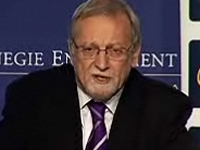Registration
You will receive an email confirming your registration.
The International Commission on Nuclear Nonproliferation and Disarmament is a joint initiative established by the Australian and Japanese governments to promote nuclear arms reductions and reinvigorate support for nonproliferation and disarmament ahead of the 2010 Nuclear Non-Proliferation Treaty (NPT) Review Conference.
On February 17, the co-chairs of the Commission, former Australian Foreign Minister Gareth Evans and former Japanese Foreign Minister Yoriko Kawaguchi, gave a briefing at the Carnegie Endowment on the Commission’s progress and future direction following meetings with senior officials in the Obama administration. At least six additional country and regional meetings have been planned with invitations extended to key government and nuclear industry leaders.
The Commission intends to produce a report of policy recommendations by year’s end focusing on the three pillars of the NPT: nonproliferation, disarmament, and the peaceful uses of nuclear energy. The co-chairs called on the U.S. to play a leadership role in five key areas:
- Ratification of the Comprehensive Nuclear Test Ban Treaty (CTBT).
- Revitalization of negotiations for a Fissile Material Cutoff Treaty (FMCT) by withdrawing U.S. objections to verification mechanisms.
- Restoration of the U.S.-Russia strategic nuclear arms control process, including conclusion of an agreement to extend or replace START I, which is scheduled to expire in December 2009.
- Initiation of a wider dialogue with Russia to find a common ground on tactical weapons, and with China to address strategic issues involving transparency and confidence-building measures, Chinese ratification of the CTBT, and the development of a multilateral arrangement on nuclear arms reductions.
- Development of a U.S. nuclear policy statement on no first use or other reassurances prior to the upcoming Nuclear Posture Review.
Question and Answer
Responding to a question about how to adapt nuclear deterrence to post-Cold War realities and facilitate movement toward nuclear disarmament, Evans said that the Commission can neither deny the important role that deterrence played during the Cold War, nor the perception among policy makers that nuclear weapons have a real deterrence effect. Kawaguchi added that reconciling the concepts of deterrence and extended deterrence are a means to eliminating nuclear weapons.
In the context of increasing concerns over energy security, climate change, and an impending nuclear renaissance, Evans said that nuclear suppliers need to minimize proliferation risks associated with nuclear energy. Educating the public on these risks is especially crucial. The co-chairs said that the Commission’s report will not be effective unless major nuclear powers embrace the report’s recommendations, but stressed that equal involvement is needed from non-nuclear-weapon states.
The Commission continues to consider a wide range of ideas and proposals: universalization of the Additional Protocol; dissuading additional countries from acquiring uranium enrichment and reprocessing capabilities by providing better alternatives; and revising or updating the "13 Steps" toward nuclear disarmament agreed upon at the 2000 NPT Review Conference so that the international community has a clear, updated, and revitalized understanding of what will be done to advance disarmament commitments under the NPT.
